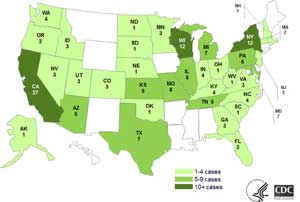A Salmonella outbreak linked to pet bearded dragons has ended after sickening 166 people in 36 states, according to a report from the Centers for Disease Control and Prevention (CDC). At least 44 people were hospitalized.
 Bearded dragons are lizards native to Australia. Their unusual look and bright color have made them popular pets.
Bearded dragons are lizards native to Australia. Their unusual look and bright color have made them popular pets.
The outbreak strains, Salmonella Cotham and Salmonella Kisarawe, are extremely rare. Since 1963, just 0.01 percent of all human isolates in the U.S. have been Salmonella Cotham, according to the CDC. That works out to about 25 cases annually. Salmonella Kisarawe is also rarely reported.
Salmonella can cause serious illnesses. Symptoms generally appear within six to 72 hours of exposure and can last up to a week. In this outbreak, onset of illness dates ranged from February 20, 2012, to June 30, 2014. Case patients, 55 percent of whom were female, ranged in age from younger than 1 year to 79 years old. The median age was 3. Fifty-nine percent of case patients were children 5 and under.
Case counts by state are as follows: Alaska (1), Arizona (5), California (27), Colorado (3), Florida (3), Georgia (3), Idaho (3), Illinois (8), Indiana (4), Kansas (6), Kentucky (4), Maryland (7), Massachusetts (2), Michigan (7), Minnesota (3), Missouri (8), Nebraska (1), New Hampshire (1), New Jersey (3), Nevada (3), New York (12), North Carolina (4), North Dakota (1), Ohio (1), Oklahoma (1), Oregon (2), Pennsylvania (6), South Carolina (1), South Dakota (1), Tennessee (5), Texas (7), Utah (3), Virginia (3), Washington (4), West Virginia (1), and Wisconsin (12).
Although this outbreak is over, illnesses are expected to continue as bearded dragons can live three to ten years and, if infected, continue to shed Salmonella throughout their lives. To keep children safe from illness, the CDC recommends that children younger than 5 years of age, seniors and those with weakened immune systems do not handle or touch amphibians or reptiles, or their habitats. Adults should supervise hand washing of children over 5.
Pet owners should wash hands thoroughly with soap and warm water immediately after touching a reptile or amphibian, their habitats, or any surfaces where they have walked. Soap or disinfectant should be used to thoroughly clean any surfaces or clothing the animal has touched. Habitats should be cleaned outside the home. The use of disposable gloves is recommended. Water should not be disposed of in sinks used to prepare food or obtain drinking water. Animals should not be bathed in o kitchen or bathroom sink, or the bathtub, but instead in a small plastic tub or bin that is dedicated for animal use only.




